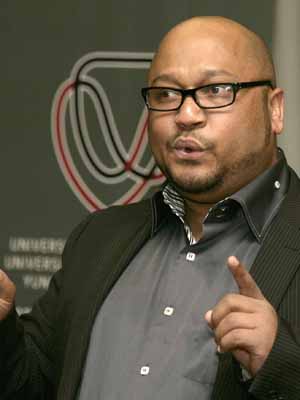|
 |
Eusebius McKaiser
Photo: Johan Roux
12 March 2013 |
The UFS Library and Information Services will celebrate South African Library Week with a public lecture by writer and political analyst, Eusebius McKaiser.
McKaiser, one of South Africa’s most influential figures, will speak about his book A Bantu in My Bathroom, his life, his love for reading and writing and the value of libraries.
Eusebius McKaiser is a political and social analyst at the Wits Centre for Ethics. He is also a top international debate coach, MC and public speaker, having been both former National South African Debate Champion and the 2011 World Master’s Debate Champion. His analytical articles are widely published in South African newspapers and he has a weekly column in the New York Times. He holds Law and Philosophy degrees from Rhodes and Oxford Universities
Thursday 14 March 2013
Mabaleng Auditorium (opposite the Faculty of Education)
17:00
Library week is celebrated annually in the third week of March with a different theme for each year. The main idea behind library week is to promote and increase awareness of the importance and the place that libraries hold in the broader community. The theme will also provide us with an opportunity to bring to the attention of the country and our leaders the role that libraries play in educating communities and the nation.
This year’s theme is “Educate yourself @ your library through displays and events.”
Enquiries: Marcus Maphile at +27(0)51 401 9393 or Maphilelm@ufs.ac.za